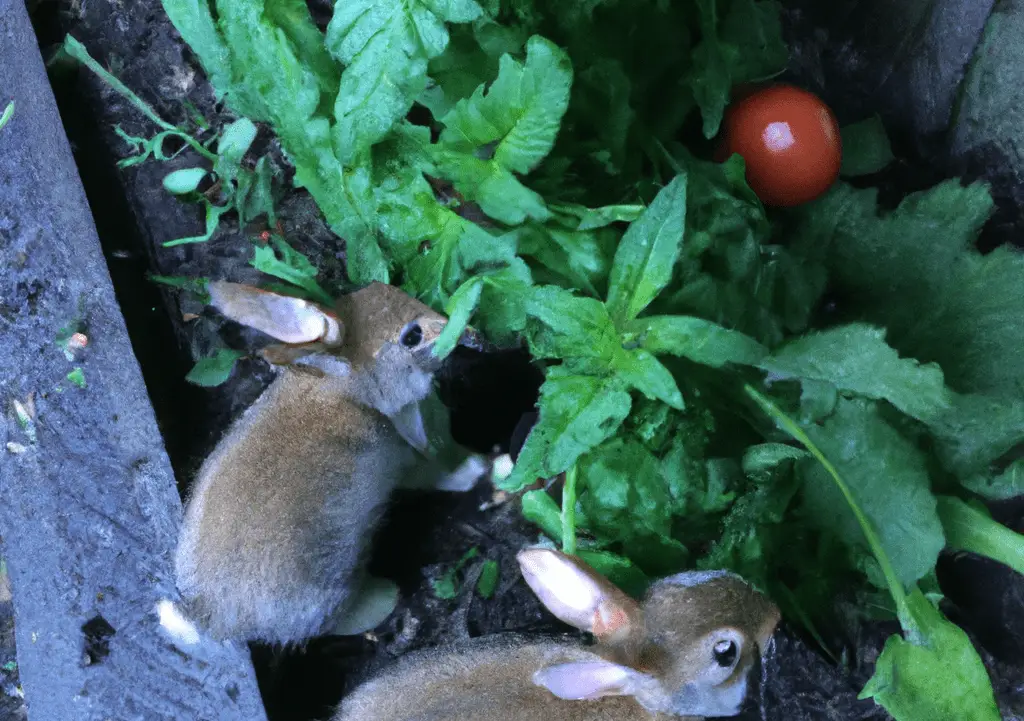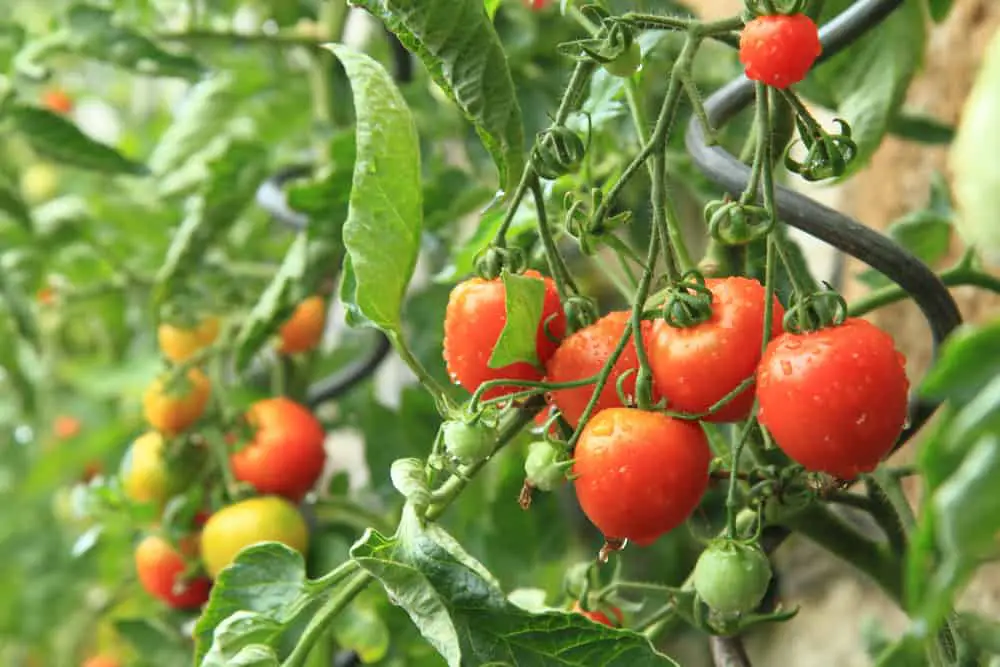I used to love watching rabbits race across my yard until the first year I planted a vegetable garden. I knew rabbits were herbivores, but I had no idea they could eat many plants so quickly. After losing all of my precious tomato plants that first season, I knew I had to figure out how to keep rabbits out of my garden.
I understood that trying to get rid of the rabbits would never work as I lived so close to the general wilderness, but there had to be some way to keep my vegetables safe from these pests. After some research, asking other gardeners, as well as trial and error, I’ve put together some solid techniques to keep rabbits from eating tomato plants.
Do Rabbits Eat Tomatoes?

Rabbits will eat tomato fruit, tomato leaves, and the whole stem or stalk of tender plants like cabbage plants and pepper plants. Rabbits do not see desirable plants in the same way that we do and will indiscriminately chomp on different parts of the plant, making clean bites without jagged edges. Rabbit feeding will be inconsistent, with chunks of leaves missing, then a bit of stem damage, followed by entire plants skipped and not touched at all.
Typically plants in the nightshade family are toxic and will harm mammals if too many of the leaves and stems are ingested. All tomato varieties produce the toxin solanine, which will lead to indigestion and other stomach issues. Rabbits are not badly affected by this toxin and will likely not eat enough of it in one meal to cause any negative effects eliminating one of mature tomato plants’ best defenses.
Why Do Rabbits Eat Tomato Plants?
Tomato plants are garden plants that rabbits love and need special care to keep safe. Rabbits chomp on these favorite plants for a variety of reasons and will keep coming back throughout the year for different treats from fruit plants and flower plants. Rabbits prefer tender plants to woody plants but will take the leaves and fruit from any individual plants they can reach. The main reasons rabbits eat tomatoes are:
Abundant Greens
We have all seen how bushy tomato plants can grow, and even a contained plant can push through wire cages and garden fences. If any leaves are exposed, passing rabbits can and will take bites and can cause a bit of damage. A mesh fence can make it harder for them to pull out individual branches, but even chicken wire will let foliage through that can feed these pests.
Several times throughout the growing season, tomatoes can be trimmed and the leaves discarded. This can attract animals like rabbits with distinct scents long-eared animals love. PIles of brush and overgrown plants can also invite rabbits in to eat and nest.
Ignored by other Pests
The toxins in tomatoes have little effect on rabbits but do a good job of staving off hoards of other pests. From insects to other herbivores, the strong scents, toxic chemicals, and prickly hairs keep tomatoes safe from pests. While other critters will find other precious plants to feast on, rabbits can happily and safely eat the neglected tomato greens with little competition.
Companion plants around tomatoes can add some additional protection, especially if it is Corsican mint or in that family of plants. These plants will repel rabbits but may not stop all feeding and only help to move them along faster. When food is scarce, rabbits will ignore bad smells and continue feeding on your garden veggies.
Sweet Fruits
Popular plants for their sweet fruits, tomatoes attract pests from all walks of life. It can even be difficult to keep these precious vegetables safe from human pests that crave organic vegetables. Leaving tomatoes unprotected will result in pesky bunnies eating your fruit, so pest control is needed.
A basic fence or cages of chicken wire are usually all that is needed to keep tomatoes safe from rabbits and rodents. Insect pests need different deterrents but still need to be controlled if you want an abundant harvest at the end of the season. The smell of ripe tomatoes will invite pests and rabbits to your garden, and plant defenses need to be prepared ahead of time.
Full of Water
During the late summer, water sources may dry up, and freshwater can become rarer. Rabbits and other pests will try to get water from tomatoes as the fruits are full of moisture. Even if not completely ripe, rabbits will bite and drink the liquid that comes out. This can result in damaged plants and unharvestable fruits.
To keep your tomatoes safe, wrap them in chicken wire mesh and place the branches where rabbits outside the fence cannot get them. Leaving water sources around your yard and in areas where rabbits roam can help keep them away from your garden. Make sure to replace water daily to avoid pests and animal diseases from spreading.
How to Keep Tomatoes Safe from Rabbits?
Rabbits are fast, can dig, and show up in large numbers, so keeping them out of your garden and away from your tomatoes can be extremely difficult. It usually takes multiple techniques and a comprehensive approach to keep your gardens free from pests, and keeping rabbits out is no exception. Without proper pest control processes, rabbits can quickly destroy your vegetable beds and eat your tomatoes.
Using a variety of pest control deterrents like traps, barriers, rabbit repellents, and natural control methods can increase the likelihood that rabbits will move on from your yard. Some products work better than others, and some techniques need more time to be effective, so try things more than once and be flexible if you want to keep rabbits away from your tomatoes for good.
| Method | Process | Effect |
| Predator Scents | Pour or spray around gardens and common rabbit areas | Scares rabbits and other garden pests away from plants by alerting them of a predator’s presence |
| Fragrant Repellents | Spray or place near tomato plants and garden entrances | Strong odors offend rabbits and cause them to search for food elsewhere, reapply after rain |
| Mylar Tape | Hang strands of Mylar from tomato branches to cause sunlight to reflect and scare off pests | Reflects sunlight and moves in the wind creating a shifting pattern but eventually, rabbits will become used to it |
| Trapping | Set live traps around your garden and bait with buckwheat or other rabbit favorites | Can catch rabbits but will not be effective if many rabbits live in the area, which is very likely |
| Barriers | Fences, wire mesh, greenhouses, and garden screens can all be used to exclude rabbits from gardens | If barriers are strong, well constructed, properly sized, and buried 6 inches deep or lower, you can effectively keep rabbits out |
| Predator Decoys | Place wind-driven or battery-powered predator decoys around your tomato plants to scare rabbits away | Decoys are effective if they accurately imitate predators and can fool rabbits; make them more effective by moving them to different places in the garden periodically |
| Motion-Activated Sprinklers | Focus sensors on known rabbit paths where droppings and other rabbit signs are present to shoot water at pests entering your garden | Can scare rabbits when a direct hit takes place, but the noise and action of the sprinkler will become ineffective quickly |
| Habitat Control | Create desirable areas for rabbits outside your garden and make your garden harder and more unpleasant to access | Attracting rabbits to other areas of your yard that will satisfy their needs can keep your garden reserved for your use; rabbits eat quickly to avoid predators, so a difficult garden to enter will be ignored for easier meals |
Repellents
Repellents are the quickest and easiest rabbit deterrents that can be applied as soon as an issue is detected. There are many homemade repellents like hot pepper spray and various essential oils. Other commercial repellents will last longer and can prove more effective at keeping pests out.
Other repellents like predator urine can help keep pests away from your garden as well as scare them into staying clear of other areas on your property. Until the rabbits are sure there is no predator nearby, they will be wary, and this will buy you time to build physical barriers.
Barriers and Traps
Humane trapping and relocating rabbits can help if there is only one or two running around your property, but in the case of many families nearby, you will need to construct physical barriers. Traps can buy you time and distract rabbits, but you will need a more permanent solution around your vegetable garden.
Wire cages, mesh barriers, and electric fencing can all be used to keep rabbits out of your garden. While these barriers may seem extreme, the damage done to vegetables, especially tomatoes, by rabbits can be swift and severe. Make sure to bury the barriers a few inches under the soil to keep burrowing bunnies from breaking in.
Scare Tactics

Any number of scary and predator decoys can be used to startle rabbits and other pests out of your garden. Plastic snakes, owls with swiveling heads, and sprinkler systems can be used to drive off animals looking for food in your garden. The more types of decoys, audio and visual, you have, the more effective they will be.
Sounds like windchimes and recordings of hawks can keep rabbits away for many weeks. Make sure to move decoys around to keep pests guessing as to what is real and what is fake. Tying reflective materials like mylar and old CDs to tomato branches can also scare off rabbits, birds, squirrels, and many other garden critters while you harvest your precious vegetables undisturbed.



